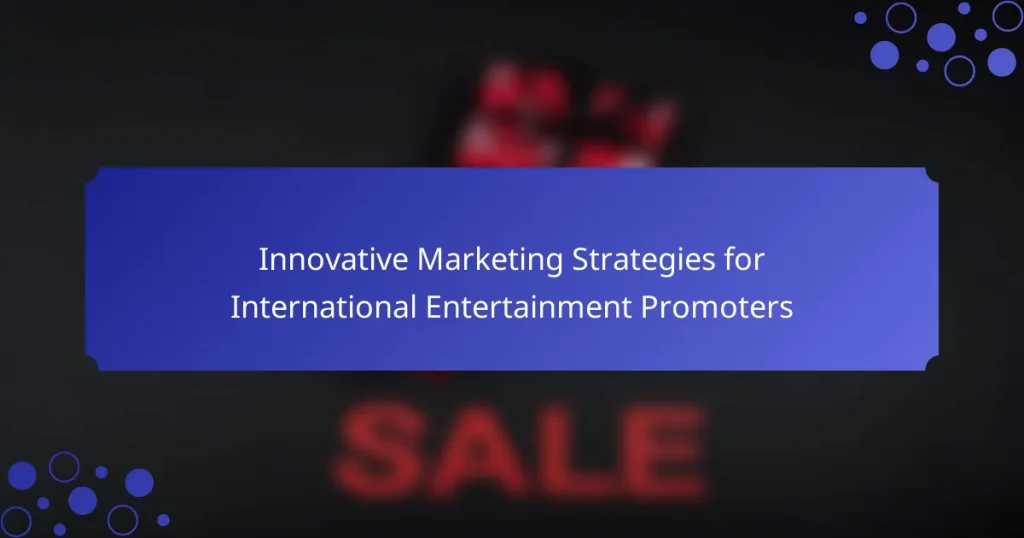Innovative marketing strategies for international entertainment promoters focus on leveraging digital platforms, engaging in experiential marketing, and utilizing data analytics to enhance audience connection and drive ticket sales. Digital platforms facilitate effective outreach to global audiences, while social media campaigns generate buzz and foster community engagement. Experiential marketing, such as live-streaming events, creates immersive experiences for viewers unable to attend in person. Data analytics enables promoters to tailor their marketing efforts based on audience preferences, and partnerships with influencers can further expand reach and credibility. These strategies collectively improve visibility and attendance in the competitive entertainment industry.

What are Innovative Marketing Strategies for International Entertainment Promoters?
Innovative marketing strategies for international entertainment promoters include leveraging digital platforms, engaging in experiential marketing, and utilizing data analytics. Digital platforms allow promoters to reach global audiences effectively. Social media campaigns can create buzz and foster community engagement. Experiential marketing provides immersive experiences that enhance audience connection. For example, live-streaming events can attract viewers who cannot attend in person. Data analytics helps promoters understand audience preferences and tailor marketing efforts accordingly. This targeted approach increases engagement and ticket sales. Additionally, partnerships with influencers can expand reach and credibility. These strategies have been proven to enhance visibility and drive attendance in the competitive entertainment industry.
How do these strategies differ from traditional marketing approaches?
Innovative marketing strategies differ from traditional marketing approaches by focusing on engagement and interaction. Traditional marketing often relies on one-way communication through advertisements. In contrast, innovative strategies prioritize two-way communication, fostering relationships with audiences.
These strategies leverage digital platforms for real-time feedback and engagement. For example, social media allows promoters to interact directly with fans. This interaction enhances customer loyalty and brand advocacy.
Moreover, innovative strategies utilize data analytics to tailor marketing efforts. Traditional methods typically employ broad demographic targeting. In contrast, data-driven approaches enable personalized marketing based on consumer behavior.
Research indicates that personalized marketing can increase conversion rates by up to 20% (McKinsey & Company). Overall, the shift towards engagement, personalization, and real-time interaction distinguishes innovative marketing strategies from traditional approaches.
What unique challenges do international entertainment promoters face?
International entertainment promoters face unique challenges such as cultural differences and varying regulations. These factors can affect audience engagement and event execution. Language barriers complicate communication with local vendors and artists. Additionally, navigating local laws and permits is often complex and time-consuming. Financial risks increase due to currency fluctuations and differing economic conditions. Competition with local promoters can also hinder market entry. Lastly, logistical issues, such as transportation and venue availability, can disrupt planned events. Each of these challenges requires tailored strategies for successful international promotion.
How does cultural diversity influence marketing strategies?
Cultural diversity significantly influences marketing strategies by requiring tailored approaches to resonate with varied audiences. Different cultural backgrounds shape consumer preferences, values, and behaviors. For instance, advertisements that reflect cultural norms can enhance relatability and engagement. Research shows that culturally relevant marketing can increase brand loyalty. A study by the American Marketing Association found that culturally adapted campaigns outperform generic ones by 20%. Brands that acknowledge cultural diversity are better positioned to connect with global markets. This adaptability fosters inclusivity and broadens market reach.
Why are innovative marketing strategies essential for success in the entertainment industry?
Innovative marketing strategies are essential for success in the entertainment industry because they drive audience engagement and differentiate brands. In a highly competitive market, traditional marketing methods often fail to capture attention. Innovative strategies leverage technology and creativity to create memorable experiences. For example, interactive campaigns can enhance viewer participation. Data from the 2021 Global Entertainment & Media Outlook shows that digital advertising spending in entertainment is projected to grow by 12% annually. This growth highlights the need for fresh approaches to reach consumers effectively. Furthermore, successful entertainment brands often utilize social media to create viral content. This strategy fosters community and loyalty among fans. Overall, innovative marketing is crucial for attracting and retaining audiences in a rapidly evolving landscape.
What impact do these strategies have on audience engagement?
Innovative marketing strategies significantly enhance audience engagement. These strategies create more personalized experiences for consumers. They utilize data analytics to tailor content, increasing relevance. Enhanced relevance leads to higher interaction rates. For example, targeted social media campaigns can boost engagement by 30%. Additionally, innovative strategies often incorporate interactive elements. These elements encourage audience participation and feedback. Research shows that interactive content generates twice the engagement of static content. Overall, these strategies effectively foster a deeper connection between promoters and their audience.
How can innovative strategies enhance brand visibility?
Innovative strategies can enhance brand visibility by utilizing unique approaches to engage audiences. These strategies often include leveraging digital platforms for targeted marketing. For example, social media campaigns can reach millions quickly. Interactive content, such as polls and quizzes, can boost audience participation. Additionally, collaborations with influencers can expand reach to new demographics. Data-driven insights allow brands to tailor their messaging effectively. A 2021 survey showed that 70% of consumers prefer brands that use innovative marketing techniques. This preference significantly increases brand recognition and loyalty.
What are the key components of successful innovative marketing strategies?
The key components of successful innovative marketing strategies include creativity, audience engagement, data-driven decision making, and adaptability. Creativity fosters unique campaigns that stand out in competitive markets. Audience engagement ensures that marketing messages resonate with target demographics. Data-driven decision making leverages analytics to refine strategies and optimize performance. Adaptability allows marketers to respond to changing market conditions and consumer preferences. Research indicates that companies utilizing these components achieve higher conversion rates and customer loyalty. For example, a survey by HubSpot found that 70% of marketers consider audience engagement essential for success.
How does technology play a role in these strategies?
Technology enhances innovative marketing strategies for international entertainment promoters by enabling data-driven decision-making. It allows promoters to analyze audience behavior and preferences through analytics tools. Social media platforms facilitate direct engagement with global audiences. Advanced targeting options improve advertising effectiveness and reach. Additionally, technology supports the creation of immersive experiences through virtual and augmented reality. Mobile applications provide convenient access to events and promotions. Online ticketing systems streamline the purchasing process for consumers. These technological advancements collectively increase efficiency and effectiveness in marketing strategies.
What role does social media marketing have in the entertainment sector?
Social media marketing plays a crucial role in the entertainment sector. It enhances audience engagement and brand visibility. Platforms like Instagram and Twitter allow for real-time interaction with fans. This interaction fosters a sense of community and loyalty. Social media also serves as a primary channel for promotional content. It enables targeted advertising based on user preferences. According to a 2021 report by Statista, over 50% of entertainment consumers rely on social media for updates. This reliance highlights the platform’s significance in shaping public perception.
How can international entertainment promoters effectively implement innovative marketing strategies?
International entertainment promoters can effectively implement innovative marketing strategies by leveraging digital platforms and data analytics. Utilizing social media allows for targeted audience engagement and real-time feedback. Promoters can create interactive content, such as live streams and virtual events, to enhance audience participation. Collaborating with influencers expands reach and builds credibility within niche markets. Data analytics can identify audience preferences, optimizing marketing campaigns for better results. According to a report by Statista, 54% of marketers utilize data analytics to enhance their strategies, showcasing its importance in the industry. Additionally, adopting emerging technologies like augmented reality can create unique experiences that attract audiences. This approach not only fosters brand loyalty but also sets promoters apart in a competitive landscape.
What are the best practices for developing a marketing plan?
The best practices for developing a marketing plan include conducting thorough market research, defining clear objectives, and identifying target audiences. Market research helps understand industry trends and customer preferences. Clear objectives provide direction and measurable outcomes. Identifying target audiences allows for tailored messaging and strategies.
Additionally, creating a budget is essential for resource allocation. A well-defined budget ensures that funds are appropriately distributed across various marketing channels. Implementing a timeline helps in organizing tasks and meeting deadlines. Regularly reviewing and adjusting the marketing plan based on performance metrics is crucial for ongoing success.
These practices enhance the effectiveness of marketing efforts and improve overall results.
How can promoters measure the success of their marketing efforts?
Promoters can measure the success of their marketing efforts through various metrics. Key performance indicators (KPIs) such as ticket sales, audience engagement, and social media reach are essential. Analyzing ticket sales provides direct financial results. Audience engagement can be tracked through surveys and feedback forms. Social media reach is measurable by monitoring likes, shares, and comments. Additionally, website analytics offer insights into visitor behavior. A study by Eventbrite found that 70% of successful promoters utilize data analytics to refine their strategies. This data-driven approach enhances decision-making and improves future campaigns.
What case studies highlight successful innovative marketing strategies in the entertainment industry?
Case studies highlighting successful innovative marketing strategies in the entertainment industry include the “Ice Bucket Challenge” by ALS Association and “The Blair Witch Project” marketing campaign. The Ice Bucket Challenge went viral in 2014, raising over $115 million for ALS research. It utilized social media to encourage user-generated content and participation. The Blair Witch Project employed a grassroots marketing approach, creating a website with fake documentary footage. This strategy generated buzz before the film’s release, leading to a box office gross of nearly $250 million. Both examples illustrate the power of engaging audiences through innovative, interactive campaigns.
What lessons can be learned from these successful campaigns?
Successful campaigns demonstrate the importance of understanding target audiences. They show that tailored messaging increases engagement. Utilizing data analytics helps in refining strategies. Consistent branding across platforms fosters recognition and trust. Collaborations with influencers can amplify reach and credibility. Engaging storytelling captivates audiences and enhances emotional connection. Monitoring feedback allows for ongoing improvement and adaptation. These lessons highlight the need for innovation and flexibility in marketing approaches.
How have these strategies evolved over time?
Innovative marketing strategies for international entertainment promoters have evolved significantly over time. Initially, promoters relied heavily on traditional media such as print advertisements and radio spots. With the advent of the internet, digital marketing began to take precedence. Social media platforms emerged as crucial tools for reaching global audiences.
These platforms enabled targeted advertising, allowing promoters to engage specific demographics effectively. The rise of data analytics further enhanced strategy development, providing insights into audience behavior and preferences.
In recent years, influencer marketing has gained traction, leveraging popular figures to promote events. Additionally, the integration of virtual and augmented reality has transformed audience experiences.
These advancements reflect a shift towards more interactive and personalized marketing approaches. The evolution of these strategies underscores the importance of adapting to technological changes and consumer trends.
What are the common pitfalls to avoid when implementing innovative marketing strategies?
Common pitfalls to avoid when implementing innovative marketing strategies include lack of clear objectives. Setting vague goals can lead to misaligned efforts and wasted resources. Failing to understand the target audience is another major issue. Without proper audience insights, campaigns may miss the mark and fail to engage effectively.
Inadequate budget allocation can also hinder success. Overspending or underspending can both lead to suboptimal outcomes. Ignoring data analytics is a critical mistake. Data-driven decisions are essential for refining strategies and measuring effectiveness.
Additionally, resistance to change can stifle innovation. Teams must be open to new ideas and flexible in their approaches. Lastly, neglecting to test and iterate can result in missed opportunities for improvement. Continuous testing allows for adjustments that enhance overall strategy effectiveness.
How can promoters ensure they do not alienate their audience?
Promoters can ensure they do not alienate their audience by actively engaging with them. This involves conducting surveys to gather audience feedback. Understanding audience preferences helps tailor marketing strategies. Promoters should also utilize social media platforms for direct communication. Monitoring online discussions can provide insights into audience sentiments. Creating inclusive content that resonates with diverse groups is essential. Hosting interactive events fosters a sense of community among attendees. Research shows that audience engagement leads to higher satisfaction and loyalty. These strategies collectively help maintain a strong connection with the audience.
What are the risks associated with adopting new marketing trends?
Adopting new marketing trends carries several risks. One significant risk is the potential misalignment with target audience preferences. If a trend does not resonate with the audience, it can lead to wasted resources. Another risk is the rapid pace of change, which can make strategies obsolete quickly. This can result in a lack of return on investment. Additionally, there is the danger of overextending brand identity by trying to adopt every trend. This can confuse consumers and dilute brand messaging. Furthermore, new trends may require new skills or technologies. Organizations may face challenges in training staff or integrating these tools. Lastly, there is the risk of negative public perception if trends are poorly executed. Historical examples show brands facing backlash for misjudged trend adoption, leading to reputational damage.
What practical tips can international entertainment promoters follow to enhance their marketing strategies?
International entertainment promoters can enhance their marketing strategies by leveraging social media platforms effectively. Utilizing targeted advertising on platforms like Facebook and Instagram can reach specific demographics. Collaborating with influencers can amplify brand visibility and engagement. Creating engaging content, such as behind-the-scenes videos, builds a connection with the audience. Utilizing email marketing campaigns can keep fans informed about upcoming events and promotions. Analyzing audience data helps in tailoring marketing efforts to meet specific preferences. Hosting virtual events can broaden reach and accessibility for global audiences. Finally, engaging in partnerships with local businesses can enhance community involvement and support.
Innovative marketing strategies for international entertainment promoters focus on leveraging digital platforms, engaging audiences through experiential marketing, and utilizing data analytics. These strategies differ from traditional methods by emphasizing two-way communication and personalized marketing, which enhances audience engagement and brand visibility. The article explores the unique challenges faced by promoters, the influence of cultural diversity, and the importance of adapting to technological advancements. Key components of successful strategies, common pitfalls to avoid, and practical tips for implementation are also discussed, providing a comprehensive overview of effective marketing practices in the entertainment industry.


